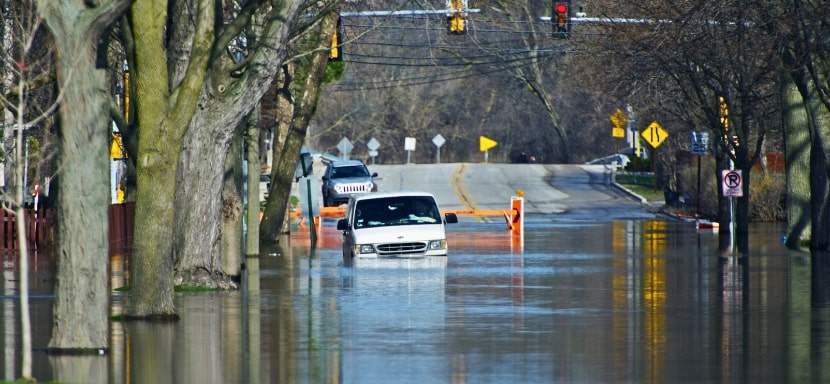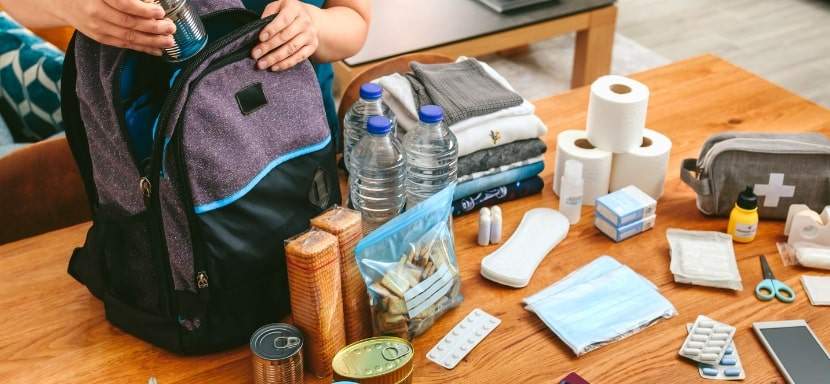How to Survive With No Electricity

Tips on How to Survive Without Electricity
A blackout can happen unexpectedly and always at the most inopportune time. Discover essential survival strategies to thrive without electricity, ensuring safety and comfort during unexpected power outages. Equip yourself with practical tips and tools for navigating life when the lights go out.
In today’s digital age, electricity is a cornerstone of daily life. However, emergencies, natural disasters, or infrastructural problems can abruptly thrust us into a reality without power. Being prepared for such a situation ensures safety and helps maintain a semblance of comfort and normalcy.
This guide examines effective strategies and practical tips for surviving without electricity, covering essential aspects such as lighting, food, water, and temperature control.
Key Points
- Stock an Emergency Kit: Include essentials like water, food, batteries, and a flashlight.
- Maintain Temperature: Use insulation and proper clothing to stay comfortable.
- Secure Water Supply: Store and purify water to ensure safety and sufficiency.
10 Useful Tips for Handling a Power Outage at Home
When the power goes out, being prepared can make a significant difference in your comfort and safety.
Check out these ten practical tips to help you manage effectively until the lights come back on:
- Stay Informed: Keep a battery-powered or hand-crank radio on hand to receive updates from local authorities.
- Use Flashlights: Opt for flashlights or headlamps instead of candles to reduce fire risk.
- Unplug Appliances: Unplugging electronics and appliances prevents damage from potential power surges.
- Maintain Food Safety: Keep refrigerator and freezer doors closed to preserve food for up to 48 hours.
- Conserve Water: If you rely on an electric pump for water, fill tubs and sinks beforehand for sanitary and drinking purposes.
- Use a Car Charger: Charge cell phones and other devices using your car’s power, but ensure the vehicle is in a well-ventilated area to avoid carbon monoxide poisoning.
- Secure Backup Heating: Provide non-electric heating options, such as wood stoves or propane heaters, following safety guidelines.
- Check on Neighbors: Ensure that elderly neighbors or those who may require extra assistance are safe and have what they need.
- Prepare an Emergency Kit: Always have an emergency kit that includes water, food, a first aid kit, and other essentials.
- Plan for Medications: Keep a sufficient supply of medication on hand that doesn’t require refrigeration, and plan for alternatives if necessary.
Common Causes of Sudden Power Outages
Power outages can occur without warning, disrupting daily life. Understanding the common causes can help you better prepare and respond.
- Severe Weather: Storms, hurricanes, ice, and snow can damage power lines and equipment.
- Accidents: Vehicle collisions with utility poles can disrupt power.
- Equipment Failure: Aging infrastructure or faulty equipment can fail unexpectedly, leading to outages.
- High Power Demand: Overloads during peak usage times can cause system failures.
- Animal Interference: Small animals like squirrels can cause short circuits in transformers.
- Planned Outages: Utilities sometimes temporarily cut power to perform maintenance.
- Natural Disasters: Earthquakes, floods, and wildfires can damage power lines and infrastructure.
- Vandalism or Theft: Deliberate damage or theft of materials can disrupt power supply.
- Cyber-Attacks: Increasingly, utilities face threats from cyber intrusions that can shut down services.
- Tree Trimming: Utilities cutting branches near power lines can accidentally cause outages.
The Importance of Being Prepared for a Power Outage
Electricity powers almost everything we do at home, from turning on lights to using our computers and keeping our spaces warm or cool. Losing electricity suddenly does more than disrupt our day; it can become a severe problem. This is especially true if the outage lasts long or during terrible weather.
When the power goes off, many essential services and comforts we often take for granted stop working. Our food might spoil because refrigerators and freezers shut down. We lose easy ways to heat or cool our homes, which can be dangerous in very hot or cold conditions. We also can’t charge our cell phones and other devices, which means we might be unable to communicate with others.
Being ready for a power outage helps us handle these challenges better. It means having the right tools, like flashlights, batteries, and a backup plan for heating or cooling. This preparation helps us stay safe and comfortable until the power returns. It also means we can better help our neighbors and community who might be struggling during the outage.
Did You Know?
During prolonged power outages, water treatment plants may lose functionality, compromising water safety. Without electricity, these facilities cannot operate their pumps and filtration systems, making it essential for residents to have alternative water purification methods, such as boiling or using chemical cleaners.
Alternative Power Options for Power Outages
When the power goes out, alternative energy sources can keep your essential appliances running and maintain some normalcy. Here’s a list of options you might consider for backup power:
- Generators: A portable or standby generator can temporarily power crucial appliances and lights. Always use them outdoors to avoid carbon monoxide poisoning.
- Solar Panels: Solar power systems can supply electricity to your home independently from the grid. They are also instrumental in battery storage, providing power at night or on overcast days.
- Battery Backups: UPS (Uninterruptible Power Supplies) or large battery packs can keep critical devices like home medical equipment and computers running.
- Wind Turbines: Small residential wind turbines can generate backup power in areas with adequate wind speeds.
- Hydroelectric Systems: A small hydroelectric generator can be a consistent and robust power source if you have a flowing water source nearby.
- Solar Generators are quiet, portable power stations that can be charged via solar panels, ideal for more minor energy needs.
- Hand-Crank Chargers: Hand-crank chargers can be a practical emergency option for tiny devices like phones and radios.
- Propane or Gas Stoves: For cooking, propane or gas stoves can be invaluable when electric stoves and microwaves are not functioning.
- Car Chargers: A car charger allows you to charge small devices like mobile phones and tablets; ensure your car is in a well-ventilated area if you use it for power.
Initial Steps to Take Immediately After Losing Power
When you suddenly lose power, the first actions you take are crucial. They help you stay safe and lessen the problems caused by the outage.
- Stay Calm: First, stay calm and check if the power outage affects only your home or if your neighbors are affected, too.
- Check the Fuse Box: Sometimes, the issue might be a tripped breaker or blown fuse in your home. Check your electrical panel to see if you need to reset anything.
- Report the Outage: If it’s not only your home, report it to your local power company. The more quickly they know, the sooner they can fix it.
- Unplug Appliances: Unplug your electronics and appliances to protect them from damage when the power comes back on. A sudden surge can break them.
- Use Flashlights: Avoid using candles, as they can cause fires. Instead, use flashlights or other battery-powered lights.
- Keep Fridge and Freezer Shut: Keep your refrigerator and freezer doors closed to keep your food cold for as long as possible. An unopened fridge can keep food cold for about four hours, and a full freezer can hold its temperature for 48 hours.
- Prepare for Needs: If you rely on electrically powered medical devices, have a backup plan ready. This might include having a portable power bank or generator.
- Listen to Updates: Use a battery-powered or hand-crank radio to get updates on the power outage and any weather conditions affecting your area.
Creating an Effective Emergency Preparedness Kit
Being well-prepared is crucial for handling any emergency, including a power outage. An effective emergency kit can make a big difference.
Here’s what you should include in your kit to stay ready:
- Water: Store at least one gallon of water per person daily for at least three days. This will cover your drinking and sanitation needs.
- Food: Keep at least a three-day supply of non-perishable food that doesn’t require cooking, such as canned goods, energy bars, and dried fruits.
- Flashlights and Batteries: Pack powerful flashlights and extra batteries to ensure you have light throughout the outage.
- First Aid Kit: Include a comprehensive first-aid kit with bandages, antiseptics, a thermometer, and any prescribed medications that might be needed.
- Battery-Powered or Hand-Crank Radio: This will keep you connected to important weather alerts and updates from local authorities.
- Extra Medication: If you or your family take prescription medications, keep an extra supply in the kit.
- Multi-Tool: A multi-tool can be invaluable for minor repairs around the house or in an emergency.
- Personal Hygiene Items: Include soap, toothpaste, sanitary wipes, and other hygiene products to maintain cleanliness.
- Copies of Important Documents: Keep copies of essential documents such as identification, insurance policies, and bank account records in a waterproof container.
- Cash: Have some cash on hand, as ATMs and credit card machines may not work if the power is out.
- Blankets or Sleeping Bags: Especially in colder climates, having warmth is essential. Pack enough bedding to keep everyone comfortable.
- Extra Clothes: Include a change of clothes for each person, focusing on practicality and weather-appropriateness.
- Chargers for Devices: Pack solar or battery-powered chargers to keep your mobile devices functional.
Water is Essential When the Electricity Goes Out
Water is essential, especially during a power outage when your regular supply might be disrupted. To ensure safety and hydration, store, conserve, and purify water. Store at least one gallon per person daily for three days in clean containers, and use water sparingly to make your supply last.
If you run out, you can find additional water in:
- Hot Water Tank: The drain valve can access many gallons of clean water.
- Toilet Reserve Tank: The upper tank contains usable water, not the bowl.
- Ice Cube Trays: Melt ice for drinking water.
- Canned Foods: Use the liquid from canned goods.
For purification, boil water for at least one minute or use bleach or purification tablets as directed. Proper water resource management is crucial for maintaining health during an outage.
Safe Food Preparation and Cooking Without Electricity
Maintaining safe food handling practices and finding alternative cooking methods become crucial when the power goes out to prevent food spoilage and ensure meal safety. Here’s how to manage food preparation and cook without electricity:
Alternative Cooking Methods:
- Gas Stoves: If you have a gas stove, you can often use it during a power outage by lighting the burner with a match. Ensure proper ventilation to avoid gas buildup.
- Charcoal or Propane Grills: Outdoor grills are excellent for cooking without electricity. Always use them outside to prevent exposure to carbon monoxide.
- Portable Camp Stoves: These stoves are excellent for outdoor cooking and are usually fueled by butane or propane.
- Solar Cookers: Utilize the sun’s power with a solar cooker. Although cooking times are longer, solar cookers are effective for baking, roasting, and steaming without fuel.
- Open Fires: If permitted and safe, cooking over an open wood fire can be a primal and effective way to prepare food outdoors.
Tips for Safe Food Handling:
- Keep Cold Foods Cold: Use ice chests with ice to keep perishable foods cold if the refrigerator is not operational. A refrigerator will keep food cold for about four hours without power if it’s unopened.
- Cook Foods Thoroughly: Use a food thermometer to ensure foods are cooked to the right temperature to kill bacteria. For instance, poultry should be cooked to 165°F (74°C), and ground beef should be cooked to 160°F (71°C).
- Minimize Opening Refrigerator and Freezer: When you open the refrigerator or freezer door, cold air escapes, raising the internal temperature and risking food spoilage.
- Use Preserved or Non-Perishable Foods: Stock up on canned goods, dry mixes, and other staples that do not require refrigeration, cooking, water, or special preparation.
General Safety Tips:
- Plan Your Meals: First, think about what you will eat from your perishable supplies. Use foods from the refrigerator, then the freezer, then the pantry.
- Use Safe Water: To rinse raw produce or use it as an ingredient in a dish that will not be cooked, use bottled water or boiling water to ensure it is clean from contaminants.
- Avoid Cross-Contamination: Keep raw meat separate from other foods to prevent bacterial spread. Use separate cutting boards, plates, and utensils for raw and cooked foods.
Keeping Warm or Cool Without Power
Maintaining a comfortable indoor temperature without electricity is a critical survival skill, especially during extreme weather conditions. Whether you’re dealing with a cold snap or a heatwave, here are some innovative solutions and preventive measures to help you stay warm or cool.
Keeping Warm Without Electricity:
- Insulate Your Space: Seal windows and doors with weather stripping or temporary materials like towels or foam to keep cold air out. Insulate walls and windows with blankets or curtains.
- Dress in Layers: Wear multiple layers of clothing to trap body heat. Opt for materials like wool or fleece, which retain warmth better.
- Use Sleeping Bags: High-quality sleeping bags designed for low temperatures can be a great way to stay warm while sleeping.
- Create a Smaller Living Space: Confine your activities to a smaller room where body heat can accumulate, preferably without many windows.
- Stay Active: Engage in light exercise to generate body heat, but avoid sweating, which can lead to faster heat loss.
- Use Safe Indoor Heaters: If available, use a kerosene or propane heater, but ensure the room is well-ventilated to avoid carbon monoxide poisoning.
Keeping Cool Without Electricity:
- Block Out Sunlight: Use curtains, blinds, or even reflective materials on windows to reflect heat away from your living space.
- Use Natural Ventilation: Open windows in the early morning and late evening to create cross-ventilation. Use strategically placed fans (battery or solar-powered) to enhance airflow if possible.
- Stay Hydrated: Drink plenty of water, which helps your body sweat and maintain a cool temperature.
- Wear Light Clothing: Opt for loose, light-colored clothing that reflects sunlight and cools your body through evaporation.
- Take Cool Showers: Use cool water to lower your body temperature. If water is limited, dampen clothes or towels and wear them.
- Relocate: If possible, spend time in the coolest part of your home, typically the basement or a room shaded from the sun.
Survival Tips for Extreme Conditions:
- Prepare for Vulnerable Populations: Ensure that children, older people, and pets have the necessary resources to stay warm or cool. This may include extra blankets or access to the coolest parts of the home.
- Avoid Hazardous Heating Methods: Never use stoves, ovens, or grills to heat indoors, as they pose fire and carbon monoxide risks.
- Stay Informed: Use a battery-powered or hand-crank radio to track weather forecasts and prepare for weather changes.
- Check Community Resources: Many communities offer resources like warming centers or cooling stations during extreme temperatures. Know where these are located and how to get to them if necessary.
Navigating Your Home Safely in the Dark
Moving safely through your home during a power outage requires careful preparation to avoid accidents.
- Set Up Light Sources: Place flashlights, battery-operated lanterns, or glow sticks in easily accessible spots throughout your home.
- Secure Candles: If using candles, put them in sturdy holders away from flammable materials to prevent fires.
- Clear Pathways: Remove obstacles like loose rugs and electrical cords from walkways to prevent tripping.
- Use Reflective Tape: Mark stair edges and door frames with reflective tape to improve low-light visibility.
- Wear a Headlamp: For hands-free lighting that follows your gaze, wear a headlamp.
- Keep Phones Charged: Ensure your cell phone is charged or have a portable charger handy for emergency lighting.
Planning for Special Needs and Vulnerable Individuals During a Power Outage
Ensuring the safety and comfort of vulnerable family members during a power outage requires careful preparation.
- Emergency Kit: Assemble a kit with essential medical supplies, medications, and comfort items specific to their needs.
- Backup Power: For those reliant on electrically-powered medical equipment, arrange a reliable backup power source.
- Contact List: Keep a list of emergency contacts, including healthcare providers and family, in an easily accessible location.
- Accessible Layout: Organize your living space to ensure easy access to essentials like restrooms and food supplies, especially for those with mobility issues.
- Diet-Specific Supplies: Stock up on non-perishable food that meets specific dietary restrictions and ensures a sufficient water supply.
- Practice Drills: Conduct regular emergency drills with all family members so everyone knows how to act during an outage.
Entertaining Yourself and Staying Sane During a Power Outage
Long-term power outages can disrupt daily routines and lead to boredom and stress, affecting mental health. Finding ways to keep yourself and your family entertained and mentally engaged without relying on electronic devices is essential. Here are some creative ideas to help you stay entertained and maintain a positive mental state during a blackout:
- Board Games and Puzzles: These are great for entertainment and can involve the whole family. Board games, card games, and puzzles provide fun challenges that can take hours to complete and are perfect for group activities.
- Reading: Catch up on your reading list. Novels, magazines, and comic books can be excellent companions. If you’re with others, take turns reading aloud to share the experience.
- Creative Arts: Drawing, painting, or crafting can be therapeutic and fun. Use whatever materials you have, such as sketch pads, yarn, or scrap materials. This is also an excellent way for children to express themselves creatively.
- Writing: Keep a journal or write stories. This can be a reflective activity and a way to document your experiences during the outage. It’s also a fantastic outlet for creativity and stress relief.
- Cooking Challenges: Experiment with recipes that don’t require electricity. For instance, try making sandwiches with various ingredients or see who can create the tastiest dish using only canned foods.
- Physical Activity: Stay active to keep your spirits up. Practice yoga, stretch, or do bodyweight exercises. Organize a mini-sports day with simple games like sack races or tag.
- Sing-Alongs or Musical Sessions: If family members play a musical instrument, have a music session or sing your favorite songs together. This can be a great mood lifter.
- Storytelling: Share stories with each other. This can be particularly entertaining and educational for children. Adults can share memories or makeup stories to tell.
- Meditation and Deep Breathing: Try meditation or deep breathing exercises to relax and maintain mental health. These practices can help manage stress levels and improve overall mood.
- Plan Future Events: Use the time to plan for future events such as holidays, birthdays, or family outings. This can be a positive way to think about the future and engage everyone in exciting discussions.
- 11. Star Gazing: If the outage occurs at night and the sky is clear, take the opportunity to observe the stars. It’s a powerful activity that can be awe-inspiring and educational.
Power Outage FAQs
What causes power outages?
Severe weather, equipment failure, accidents, utility work, or overloads on the electrical system can cause power outages.
How long do power outages usually last?
Depending on the cause and the area affected, the duration of a power outage can vary from a few minutes to several days or longer.
What should I do if the power goes out?
Report the outage to your utility company, unplug sensitive electronic equipment, use flashlights instead of candles to prevent fire hazards, and keep refrigerator and freezer doors closed.
How can I prepare for a power outage?
Assemble an emergency kit, including water, non-perishable food, flashlights, batteries, a first-aid kit, and other essentials.
Is it safe to use a generator during a power outage?
Yes, but only if it’s operated outside and away from windows to prevent carbon monoxide poisoning, and it should be connected properly to avoid electrical hazards.
How do I keep food safe during a power outage?
Keep freezer and refrigerator doors closed as much as possible, and use a thermometer to check food temperatures. Do not consume foods above 40°F for more than 2 hours.
Essential Tips for Managing Without Electricity
Surviving a power outage smoothly requires preparation, flexibility, and calm. By implementing the strategies in this guide, you can protect your safety, continue essential routines, and minimize the impact of losing electricity. These practices prepare you for emergencies and enhance resilience and resourcefulness in daily life.
Prepare an emergency kit with water, food, flashlights, and first aid supplies. Familiarize all household members with a well-defined emergency plan. Invest in alternative power sources such as generators or solar panels to ensure backup energy is available.
Maintain calm by managing stress and keeping a routine during outages—this could include physical activities and regular meal times, powered or not.
Embracing these measures equips you to handle outages easily and bolsters your capability to face other challenges confidently, ensuring comfort and safety in any situation.
Uncommon Facts About Power Outages
Power outages often interrupt our daily routines, but there’s more to these events than meets the eye. Here are some lesser-known facts about power outages that may surprise you:
- Astronomical Costs: Power outages in the U.S. can cost the economy up to $150 billion annually, with weather-related disruptions accounting for most of these costs.
- Wildlife Interference: Small animals like squirrels and birds are among the most common causes of power outages. They can trip transformers and disrupt power lines, causing widespread outages.
- Vulnerable Grids: The U.S. power grid is often described as aging and vulnerable, making it susceptible to failures from minor issues to major storms.
- Cyber Threats: Power grids are increasingly targets for cyber-attacks that aim to disrupt essential services, reflecting a growing area of concern for national security.
- Solar Flares: Intense solar flares can knock out transformers and power grids. A massive solar storm in 1859, known as the Carrington Event, caused widespread telegraph outages and is a classic example of what might happen today on a larger scale.
- Health Impacts: Extended power outages can lead to significant health issues, particularly those who rely on electrically powered medical devices or live in extreme climates.
- Island Vulnerability: Islands, especially remote ones, face more significant challenges during power outages. Their isolation makes repairing and restoring power much more complex and time-consuming.
- Fridge Lifespan: During an outage, a full freezer will keep its temperature for about 48 hours if unopened, compared to just 24 hours for a half-full freezer.
More Real Life Scenarios
How to Survive a Layoff
Layoffs feel personal—even when they’re not. One day, you’re responding to Slack messages and forwarding…
How to Survive a Drug Test
I never imagined I’d be so emotionally invested in a paper cup. But there I was, standing under the fluorescent…
How to Survive an Interrogation
If you’ve ever been caught in the crosshairs of an overly enthusiastic mall cop or stared down by someone…
How to Survive a Bachelor Party
A bachelor party is a delicate mix of celebration, chaos, and questionable decision-making, wrapped…
How to Survive Your First Time at the Gym
Walking into a gym for the first time can feel like stepping into an alien world. The machines hum with…
Recent Survival Posts
How to Survive a Layoff
Layoffs feel personal—even when they’re not. One day, you’re responding to Slack messages and forwarding…
How to Survive a Drug Test
I never imagined I’d be so emotionally invested in a paper cup. But there I was, standing under the fluorescent…
How to Survive an Interrogation
If you’ve ever been caught in the crosshairs of an overly enthusiastic mall cop or stared down by someone…
How to Survive a Nightclub Shooting
Nightclubs pulse with life—lights flashing, music pounding, bodies packed tight on the dance floor. It’s a place to…
How to Survive a Bachelor Party
A bachelor party is a delicate mix of celebration, chaos, and questionable decision-making, wrapped…
More Real-Life Survival Scenarios

How to Survive a Drug Test
The Cup, The Room, The Truth I never imagined I’d be so emotionally invested in a paper cup. But there I was, standing under the fluorescent hum of a strip-mall clinic, trying to recall the last time I ate a poppy seed bagel. That’s the thing about drug tests—they...

How to Survive an Interrogation
If you've ever been caught in the crosshairs of an overly enthusiastic mall cop or stared down by someone in a uniform with a clipboard and a glare, you’ve felt it — the chilly fingers of interrogation anxiety. And while most of us imagine interrogation scenes as...

How to Survive a Bachelor Party
A bachelor party is a delicate mix of celebration, chaos, and questionable decision-making, wrapped in the noble intention of sending the groom off into married life with a night he’ll (hopefully) remember. It’s a ritual as old as time—well, as old as men deciding...

How to Survive Your First Time at the Gym
Walking into a gym for the first time can feel like stepping into an alien world. The machines hum with purpose, the regulars move confidently, and you’re left standing there, clutching your water bottle, wondering whether you’re in the right place—or on the right...

How to Survive a Missed Package Delivery
Life throws curveballs. One moment, you’re eagerly waiting for your package like a kid on Christmas morning, and the next, there’s a smug little note stuck to your door. A missed package delivery. It feels like a breakup letter from the universe. But don’t worry—I’ve...
More Survival Scenarios

How to Survive a Layoff
When the Floor Falls Out: The Reality of a Layoff Layoffs feel personal—even when they're not. One day, you're responding to Slack messages and forwarding emails. Next, you're staring at your monitor as it logs you out... for good. Whether it's a restructuring, a...

How to Survive a Drug Test
The Cup, The Room, The Truth I never imagined I’d be so emotionally invested in a paper cup. But there I was, standing under the fluorescent hum of a strip-mall clinic, trying to recall the last time I ate a poppy seed bagel. That’s the thing about drug tests—they...

How to Survive an Interrogation
If you've ever been caught in the crosshairs of an overly enthusiastic mall cop or stared down by someone in a uniform with a clipboard and a glare, you’ve felt it — the chilly fingers of interrogation anxiety. And while most of us imagine interrogation scenes as...

How to Survive a Nightclub Shooting
Nightclubs pulse with life—lights flashing, music pounding, bodies packed tight on the dance floor. It’s a place to escape, feel the rhythm, and lose yourself in the crowd. But that same energy can turn deadly in seconds, transforming a night of fun into one of the...

How to Survive a Bachelor Party
A bachelor party is a delicate mix of celebration, chaos, and questionable decision-making, wrapped in the noble intention of sending the groom off into married life with a night he’ll (hopefully) remember. It’s a ritual as old as time—well, as old as men deciding...

How to Survive Your First Time at the Gym
Walking into a gym for the first time can feel like stepping into an alien world. The machines hum with purpose, the regulars move confidently, and you’re left standing there, clutching your water bottle, wondering whether you’re in the right place—or on the right...

How to Survive a Worldwide Communications Breakdown
Imagine waking up to silence. Your phone doesn’t buzz, your email won’t load, and even your local radio station crackles with static. A worldwide communications breakdown has hit. What next? For many, this doomsday scenario may sound like the opening lines of a...

How to Survive a Flash Flood While Driving
Surviving a flash flood while driving requires quick thinking, calmness, and a solid plan to ensure your safety. Preparation can make all the difference between a close call and a catastrophe in emergencies like this. This guide provides practical advice to protect...

How to Build an Emergency Kit
Emergencies don’t knock politely at the door. They barge in, uninvited, like a distant relative with a penchant for drama, turning your world upside down without warning. Whether it’s a power outage, a natural disaster, or an unexpected evacuation, the key to staying...

How to Protect Yourself From Insects in the Wild
There’s nothing like being out in the wild—birdsong echoing through the trees, the fresh scent of earth, and a deep sense of peace that makes you think, “Ah, this is what life is about.” But then comes the buzzing. Mosquitoes, ticks, and flies swoop in like uninvited...
